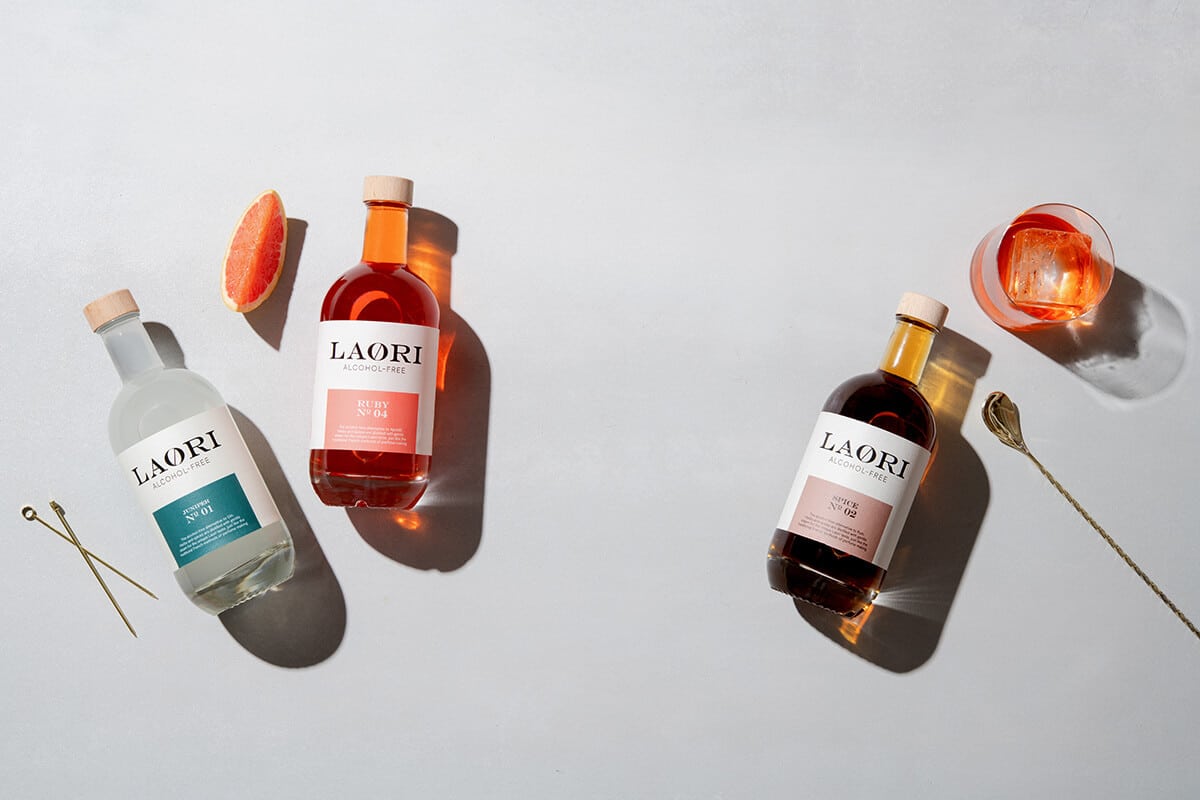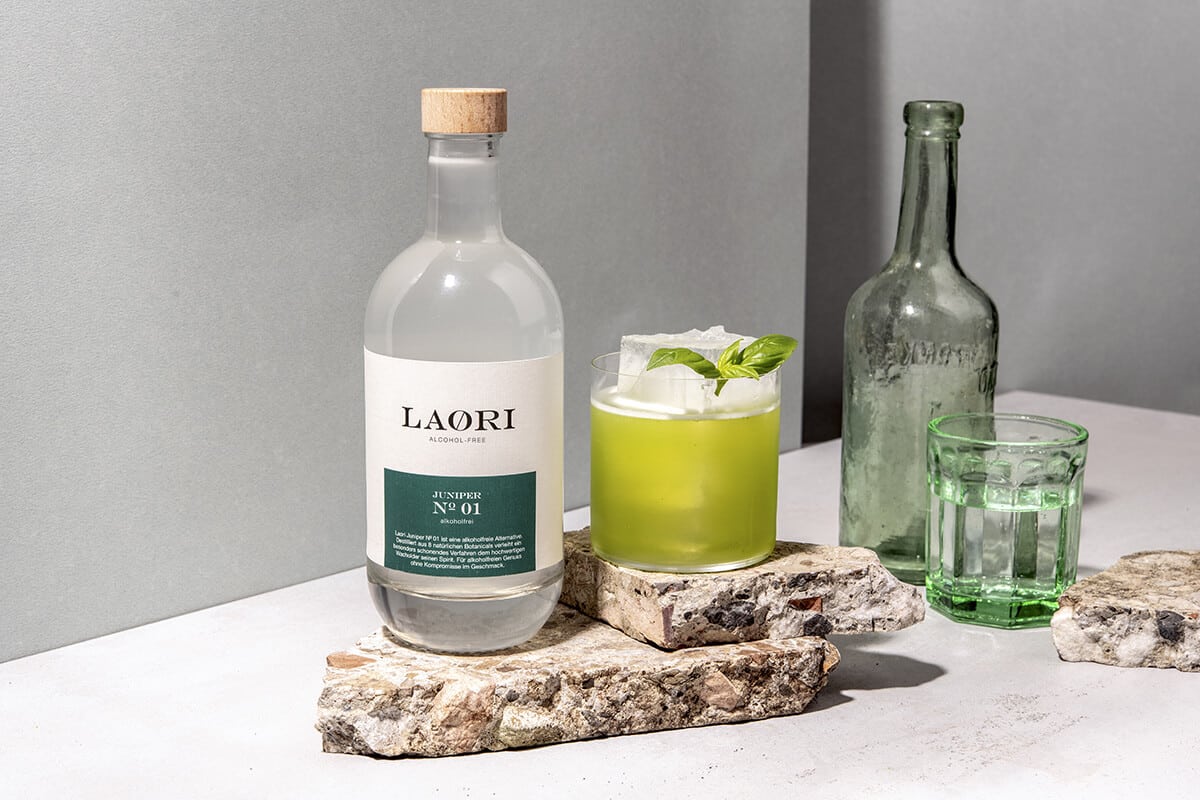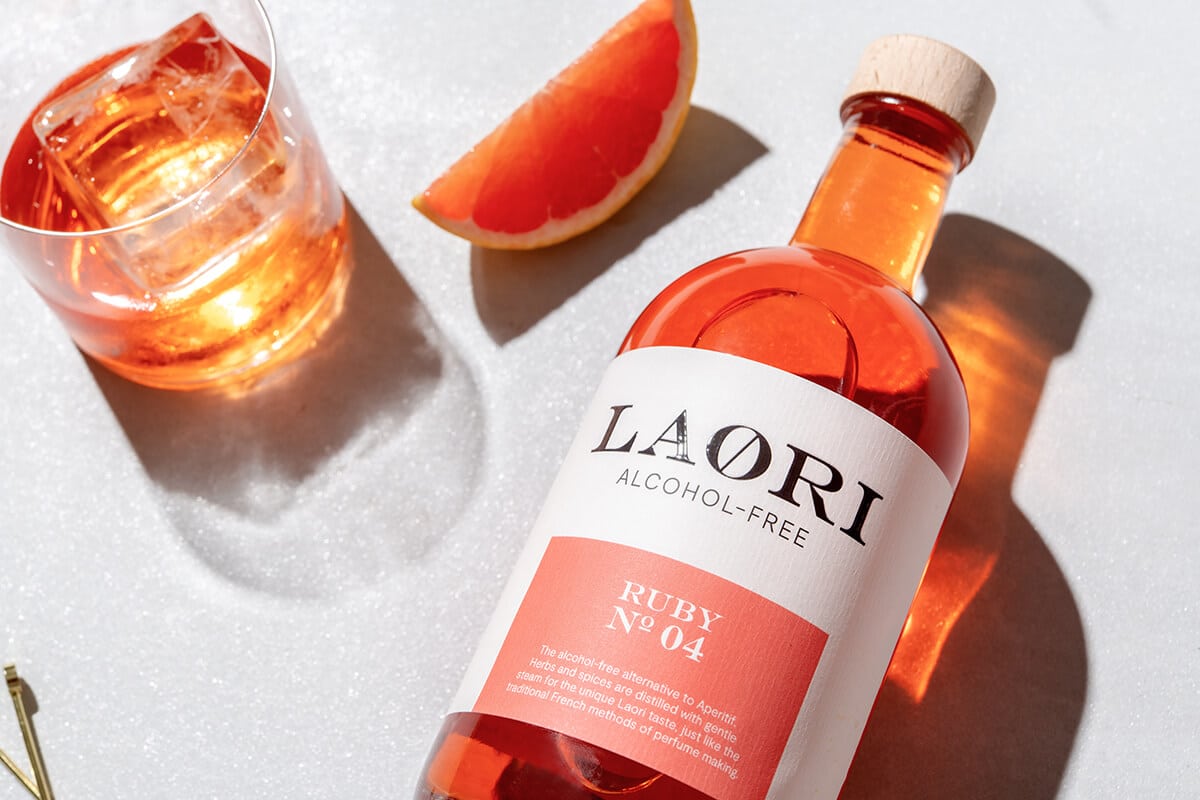With her company Laori, founder and CEO Stella-Oriana Strüfing captures the zeitgeist of the Healthy Living Community. Today, we take an in-depth look behind her alcohol-free recipe for success in a joint Role Model Interview at FemalExperts.
Dear Stella-Oriana, nice that you want to introduce yourself to our community. Perhaps you might answer the (probably) most important question first: Who is Stella-Oriana Strüfing?
I am the founder and CEO of Laori, epicurean and expert in good non-alcoholic drinks. Before Laori, I worked as a coach for high-tech startups. With Laori, I finally had the idea that stuck with me myself and led me to create my own startup.
You founded your company together with Christian Zimmermann. Why did you choose an alternative product to gin for this?
We founded Laori out of my own need. The idea for this was born one evening in a bar. I didn’t want to drink alcohol and the drink selection was too sweet or boring for me with soft drinks, water and juice cocktails. I just wanted a gin & tonic without alcohol. So it happened that our first product with Laori was to be an alcohol-free alternative to gin. With Laori Juniper No 1 we have developed a product that can be used as versatile as an alcoholic gin, but without the hangover the next day. Meanwhile, Laori has an entire portfolio of non-alcoholic spirit alternatives with a non-alcoholic aperitif and a non-alcoholic alternative to rum.

How can we imagine the path from a home kitchen distillery to a professional business?
In the beginning, I actually distilled myself in my kitchen and tried different processes and recipes. The next step was to look for experts who could translate my ideas into a standardized procedure. That’s how I met my co-founder Christian. He studied product development and took over product development in the following months. We made a tight schedule of when to launch our product and worked towards it. In the meantime, I took care of the brand, the business plan and the financing of our start-up. After nine months, we went ahead and launched Laori. To make Laori great and grow steadily, we worked with very clear goals that we exceeded every year.
In times when it feels like every second actor (deliberately not gendered) is launching their own alcohol product, I find it very challenging to go to market with a counter-concept to the common “pleasure paradigm”. How did you feel about entering the market?
Exciting question. The counter-paradigm to this is that probably every second actor and actress abstains from alcohol. This opens up a broad target group for us, who consciously forgo alcohol and want an enjoyment alternative instead. We also experienced this when we entered the market. There are very many people who consciously abstain from alcohol. Whether it is due to pregnancy, medication, religious reasons or consciously abstaining because it is not good for you. These are the groups we have sought out and deliberately addressed as we solve an acute problem. As a result, Laori was well received from the start, as there was nothing like it for good and adult drinks without a hangover.
With your business idea you are not only selling an alternative product to common juices or soft drinks, your business philosophy is also about more ethics in business. What exactly is your specific concern here?
Sustainable business is a basic building block of Laori. We always try to source our raw materials as locally as possible, avoid using plastic, and grow herbs and spices in an environmentally friendly way. Thus, whenever possible, we use organic quality herbs and spices, even if certification is not possible for our products.
You are not only talking about ethics and sustainability, but also specifically implementing these values in your own production process. What is special about your particular distillates, which are often described as borrowing from French perfume distillation?
With Laori, we have developed our own innovative manufacturing process derived from French perfume distillation. This naturally recreates the smell and taste of popular spirits. Our team uses only real herbs and spices in the production and avoids artificial flavors and unnecessary additives. In doing so, we develop our products according to the guiding principle: Ingredients that we cannot pronounce or explain have no place in a food product. All products are also vegan and the packaging is reusable and 100% recyclable.
The combination of product development and knowledge transfer in your field is particularly exciting. For example, you can use your magazine for non-alcoholic drinking culture to educate and inform people about alcohol and to show how delicious non-alcoholic enjoyment can be. Why is educational work in this area particularly important?
We are moving into an area that has never existed before. When we went to the market in 2020, non-alcoholic cocktails consisted of various juices. For us it was only natural to show in our magazine and on Instagram different recipes that are possible with Laori. The beauty of our non-alcoholic alternatives to gin, rum and aperitif is that they are so versatile. Not only can you mix a non-alcoholic drink with it, but you can enjoy a variety of good drinks from Gin & Tonic to London Mule.
The community character is also important for us. With Laori, we have created the largest alcohol-free community in Germany on Instagram, where you can exchange ideas with each other, we make fun of stupid sayings about alcohol-free drinking and show how much pleasure alcohol-free can give.
At the beginning, very many stumble over the issue of “visibility and reach”. To what extent are these components important for entrepreneurial success and how did you approach this topic area in concrete terms?
Here I can only quote our business angel Tijen Onaran: “If you are not visible, you do not take place”. For us, visibility has been one of the most important pillars of our company’s success from the very beginning, especially during the Corona years. Here we started early and were able to build a strong community.
Especially at the beginning of a start-up, it is important to think about who can serve as a multiplier:in. For us, these were events, collaborations with influencers and competitions, but also our own social media channels, which we used constantly.
Speaking of reach: Even if it sounds a bit strange, but not getting the deal in the “Höhle der Löwen” was actually an absolute stroke of luck in your case. Immediately after, Faraday Venture Partners invested a six-figure sum in your company, valuing Laori much higher than it was originally valued in the Lion’s Den. How did you manage to convince the investors of your merits?
Investors are always convinced by a good product, a strong founding team and a growing company. We have managed to increase our sales every month and meet all the requirements for an attractive investment.
In 2020, “Laori Juniper No 1” was awarded the FIC 2020 Food Award for Best Product. Furthermore, you were awarded the Digital Female Leader Award and additionally won the founder and CEO of Global Digital Women Tijen Onaran as an investor. Many female founders often wonder about such events: Lucky coincidence or strategic action?
I would say both! Entering contests is strategic for now, as they help you increase your visibility. Then winning these competitions is another matter. More than 800 women applied for the Female Digital Leader Award. I never thought I had a chance to win. That’s why I was all the more pleased to be among the finalists. However, I would never have imagined that I would win an investor over a year later.

What tips would you give (aspiring) founders when it comes to convincing others (cooperation partners/investors/customers, etc.) of their merits?
Many people think for a long time about whether they should really write to someone and how they get into conversation with people. I did that in the beginning too, until I understood if I don’t do it, no one will do it for me. Since then, I simply write to the people I want to get in touch with. The worst thing that can happen is that they don’t answer. The chance is 50/50. Depending on the topic, I’ll see if someone can make me an intro to increase my chances.
Were there any other challenges for you as a (female) founder at any point in the founding process or in the distribution of your product than your co-founder Christian had?
Yes, you notice that from time to time. Many people naturally assume that the man in the imprint is the managing director. This sometimes leads to funny conversations on the phone.
Likewise, I notice it more often in negotiations. I am sometimes called emotional, although I just negotiate hard and just don’t do what my counterpart wants and very definitely refuse.
Finally, I’d like to ask you my absolute favorite question: Laori is now THE first non-alcoholic alternative to gin that tastes like its alcoholic counterpart, but isn’t one. What are your next steps? What will you and Christian conquer the market with next?
We have just launched our non-alcoholic aperitif Laori Ruby No 4, with which you can mix a delicious non-alcoholic spritz. This rounds off our portfolio for the time being and we want to make Laori more widely available so that our customers can buy Laori everywhere.

Dear Stella-Oriana, thank you for this particularly exciting interview. It is always inspiring to see female founders venturing into a market that has previously been denied to them. I look forward to seeing you again in the future and sharing many new insights with our FemalExperts community.
About the author
Kinga Bartczak advises, coaches and writes on female empowerment, new work culture, organizational development, systemic coaching and personal branding. She is also the managing director of UnternehmerRebellen GmbH and publisher of the FemalExperts magazine .













